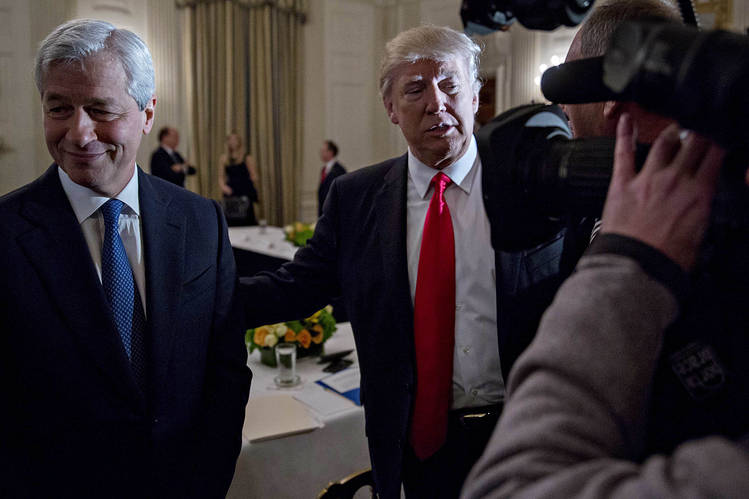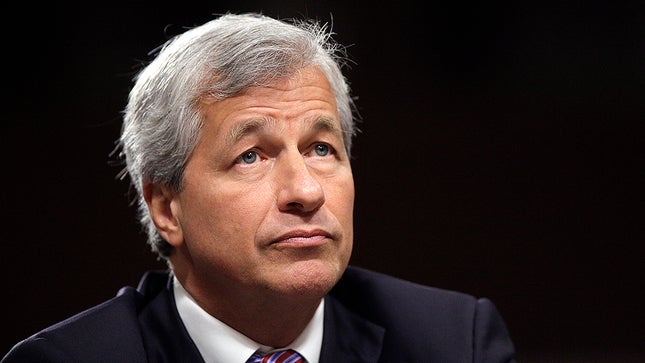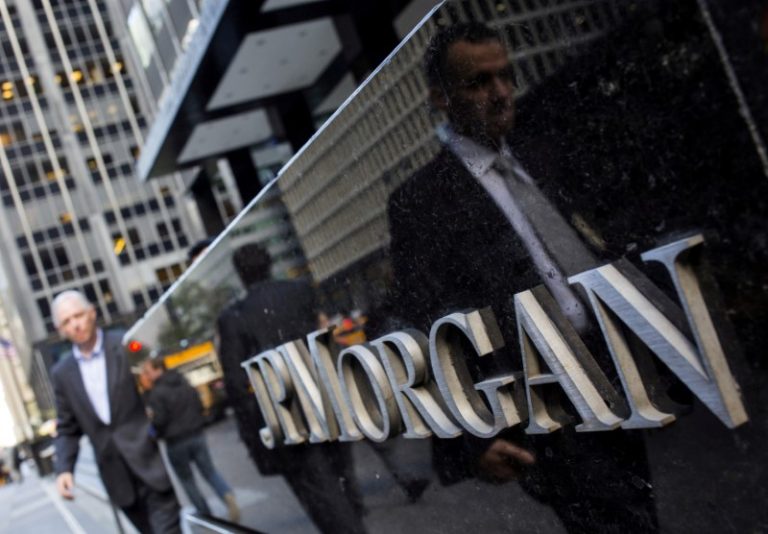JP Morgan is one of the largest and oldest investment holdings in the United States, whose weight in the global financial sectormore than enough to ask inher trends. This article presents the history of JP Morgan's stormy relationship with cryptocurrencies and blockchain technology. We will mainly be interested in metamorphoses in the attitude of the banking giant to the young industry, how this attitude has changed over time and how such an archaic structure came up with the idea of launching its own stablecoin.
</p>Jamie Dimon - Wall Street genius
The hero of our article today will be one ofthe most talented and influential people in the finance and business industries, JP Morgan Chase CEO James Dimon. He began his work in banking in the 90s of the last century and in 2000 became the CEO and Chairman of Bank One.
In 2004 he went to work at JP MorganChase & Company for the position of chief executive officer (COO). And already on the last day of 2005, Dimon became the chief executive officer (CEO) and president of JP Morgan Chase, and a year later he took the place of chairman of the company’s board of directors.
Between 2011 and 2015According to Bloomberg, Jamie Dimon was the highest paid bank CEO in all of North America. As of November 2019, his fortune is estimated at 1.6 billion US dollars.

Dimon is the permanent director of JP Morgan.for almost 14 years now, and during this time the bank's shares have grown by 66%. As an illustration, it is worth saying that the shares of 87 companies that, in addition to JP Morgan, are included in the Standard & Poor's Financials fell 22% overall during this period. Jamie is one of the brightest stars on the US financial horizon: he played a significant role in the fact that the country's banking sector was able to withstand the mortgage crisis of 2007. Moreover, unlike many competitors, JP Morgan also remained profitable at this time.
What bitcoin did not please the head of JP Morgan
Based on the above information, you can doconclusion that Jamie Dimon is a «god level» in finance and business. Well, the conclusion is certainly not far from the truth, but this does not mean that the statements of the CEO of JP Morgan can be blindly believed and accepted as the ultimate truth. “Homo sum, humani nihil a me alienum puto” (I am a man, and nothing human is alien to me), as the ancient classic said - and in this case this popular expression comes in handy.
Over the years, Dimon has given dozens of brilliantheadlines for various cryptocurrency publications. His statements have more than once had a direct impact on the Bitcoin rate, of which the head of JP Morgan turned out to be an outspoken critic.
JP CEO's strained relationshipMorgan and Bitcoin have long been a controversial topic in the cryptosphere. The "it's a scam and shouldn't be ignored" remarks that Dimon publicly made about Bitcoin have somehow become part of the public's perception of cryptocurrencies.
For the first time, Daimon expressed his negative attitudeto the main cryptocurrency in November 2015 - remember, at that time the BTC rate was at $300. Then the banker said that not a single state in the world would accept digital coins that could be used in different countries.
According to Dimon, one of the main tasksThe state is issuing its own money. Therefore, the government of any country, quite naturally, wants to control the national currency through the central bank. For this reason, officials will never support Bitcoin or any other cryptocurrency, and if the popularity of the latter begins to grow, then, most likely, this type of money will be banned.
In early 2016, when BTC bounced off the bottom and began to rise, Dimon was confident that the “Bitcoin story would end in nothing.”
Perhaps one of the most memorable attacksJamie Daimon on Bitcoin occurred during his speech at a banking conference in September 2017. Then he compared “bitcoinomania” with tulip mania of the 17th century.
«This scam will be worse than tulip bulbs. This won't end well. This will kill someone,” Dimon said.
A particularly odious moment of this speech was that Dimon promised to personally dismiss any JP Morgan trader who would be caught on cryptocurrency transactions:
«Firstly, this is against our rules, and secondly, these people are stupid».
According to Daimon, both of these factors arecritically dangerous for employees of his company. He said that he would not mess with any financial transactions involving digital currencies, since it is not clear what value they will grow before they collapse.
«If we were talking about Venezuela, Ecuador,North Korea and similar places, or about drug dealers, murderers and all that, then Bitcoins would probably be more useful here, not US dollars. Perhaps there would be a market for them, but this market is very limited,” Dimon noted.
After such a statement, despite the franklythe bull market, the bitcoin exchange rate collapsed, losing over 20% in just a few days. The fall was temporary, but served as a clear example of how one negative statement in the direction of cryptocurrencies can affect their course.
In response to Daimon’s escapade, one of the leadersAccording to the crypto world, TV presenter Max Kaiser, during his emotional speech at Erasmus University in Rotterdam, called the financial system of the United States, led by Wall Street, fraud, and the bankers themselves - terrorists.
«Wall Street is a scam.America is a fraud. Banks are a scam. Central banks are a scam. We live in an era of fraud,” Kaiser proclaimed to the audience. «Everything here is based on fraud, and they get their percentage from this fraud. This is the business model». “We live in an era dominated by financial terrorists,” Kaiser added. «Banking Jihad is here to destroy itself with us!»
Jamie Dimon offers a truce
In general, the resonance from Jamie lunges asideBitcoin and cryptocurrencies turned out to be very significant. From many sources, accusations were even heard of the interest of the head of the banking giant in lowering the rate of bitcoin - despite the fact that in words the company’s traders were forbidden to deal with cryptocurrencies, such actions were discovered by journalists and made public.
A few months later, namely January 9, 2018years, a few days before the start of the altcoin correction, CEO JP Morgan in one of the interviews said that he regrets that he spoke about bitcoin and cryptocurrencies earlier.
“I regret that I made such statements,” the banker said.

No, Jamie hasn't turned into a devotee.Bitcoin, but this statement certainly showed that he has clearly softened his stance on digital currencies. This time, Dimon spoke more about the value of blockchain technology, but once again emphasized that Bitcoin still does not arouse his interest.
«I just have a different opinion about Bitcoin than other people. “I’m not interested in him at all,” said the banker.
Almost all of 2018, Jamie Dimon did notno loud statements on this topic, but October 30 could not stand it and hit the main cryptocurrency with a new wave of criticism. At the Axios Los Angeles conference, he made the following statement.
«I haven't changed my mind.I was just saying that I regret having to say that. In fact, I wouldn't give a penny for it, that's the point. What does seem real is blockchain technology, and Bitcoin is not up to par with fiat money,” Dimon concluded.
JP Morgan and the «real blockchain»
After this speech, bank representativesagain I had to answer questions from journalists, and then one interesting detail became clear: the company has been closely monitoring the cryptocurrency space for a long time and, moreover, is thinking about introducing blockchain technology into its business.
As it became known a little later, despitepublic statements by the head of the company, JP Morgan has been working hard to explore blockchain. The fact is that the London-based fintech division of the Wall Street giant began developing a blockchain strategy even before its director’s public attacks on cryptocurrencies. Responsible for the development of this area was 29-year-old Oliver Harris, whose responsibilities included the development and supervision of new cryptocurrency projects.
In an interview with the press, Harris emphasized: Cryptocurrency trading is not included in the holding's intentions. A key aspect of the unit's activities is the study of digital asset storage and the introduction of blockchain technology in the company's business processes.
In April 2018, JP Morgan together with banksANZ and Royal Bank of Canada launched testing of its own blockchain platform Quorum Blockchain. The Quorum network itself was developed back in 2016 as part of the Ethereum Enterprise Alliance (EEA), one of the founding partners of which is JP Morgan.
The platform is modeled after the clientEthereum Go and operates on the Ethereum blockchain. In 2018, Quorum was already in full use by large pharmaceutical companies, in particular Pfizer and Genentech, as well as technology giants, including Microsoft Azure. In March 2018, JP Morgan Chase announced that it was considering turning Quorum into a separate company, as more and more partners were involved in the project, some of which were direct competitors to the bank.
«What is JP Morgan's official position onregarding cryptocurrencies?» - says a statement on the bank's official website. «We have always believed in the potential of blockchain technology and support cryptocurrencies as long as they are properly controlled and regulated. As a globally regulated bank, we believe we have a unique opportunity to responsibly develop this potential under the oversight of our regulators.
Development and announcement of JPM Coin
In February 2019, Valentine's Day,financial holding JP Morgan Chase officially announced the release of its own cryptocurrency - JPM Coin. The statement said that through a new digital coin, the company plans to carry out instant and secure transactions.
On February 19, Bloomberg reported that the rise in the price of Bitcoin was likely largely due to the public «acceptance of cryptocurrencies» JP Morgan.
To launch JPM Coin, developers had tomodify the Ethereum blockchain. The key difference between the Quorum network in which JPM Coin operates and Ethereum is its privacy. The fact is that the brainchild of Vitalik Buterin is a public network, and in Quorum the data is encrypted in such a way that only participants in the transaction can access it.

JPM Coin is a stable coin, its rate is alwayswill be 1 US dollar. It is worth noting that, unlike other cryptocurrencies, JPM Coin will not be sold on the open market. As conceived by the developers, the required number of coins will be issued each time a money transfer is made, immediately redeemed for an equivalent amount and destroyed. That is, JMP Coin will only work as an internal unit of calculation.
“We only want to speed up transactions, and not reinvent money,” the bank emphasized.
The initiative will help the holding significantly reducetime taken to complete transactions. The fact is that using a digital token, you can make bank payments at any time of the day or night, while traditional money transfers can be made only in the daytime. And, perhaps, the main reason for introducing its own cryptocurrency is the bank’s desire to eventually abandon the services of such an outdated structure as SWIFT.
Interestingly, two weeks after launchJamie Dimon said that JP Morgan's plans for the recently announced stablecoin are not limited to the fact that the coin will exist only as a unit of account in the bank's operations. Dimon said he does not deny the possibility that JPM Coin will eventually become available to the general consumer.
“The JP Morgan coin can be used for both domestic and commercial purposes, and one day it may well become available to the average consumer,” he said.
In the near future, according to the originalthe plan, stablecoin is planned to be used exclusively to optimize transactions between banks and large businesses. The head of the JP Morgan blockchain division, Umar Farouk, on the day of the announcement of the launch of the project, stressed that to date, the use of JPM Coin is planned only in the bank’s internal system and has identified three main areas of coin use: for making instant international payments, for operations with securities and as a replacement for the dollar for corporate bank customers using storage services.
Key Features JPM Coin
1. The coin is designed for instant transfer of funds worldwide. It usually takes some time to transfer funds internationally, but with the development of stablecoin technology from JP Morgan, money can be transferred instantly.
2. JPM Coin is not a cryptocurrency. To be such, the technology must be open and not require permission to download, and access to it must be from a public platform. The stablecoin from JP Morgan does not meet any of these criteria.
3. Only JP Morgan customers have the option to use the coin. In addition, bank customers will need to obtain special permission from the bank to use stablecoin.
4. JPM Coin is a direct competitor to Ripple. Ripple, the third largest market capitalizer in the crypto space, has so far been the only one to provide the popular cryptocurrency transfer service from one country to another at a very high speed. Now, with the development of such a service from JP Morgan, part of the Ripple market will have to be given to the banking giant.
5. Anyone who intends to use the JP Morgan coin, whether an individual or an organization, will have to go through a series of checks such as Anti Money Laundering (AML) and Know Your Customer (KYC). This measure is designed to reduce the possibility of fraud in transactions related to JPM Coin.
6. In the case of JPM Coin, the risk of unsecured stablecoin in real assets is completely absent: the issuer of the coin is a financial entity, whose annual income is about 109 billion US dollars. Moreover, the coin will be under the control of regulators and strict internal standards of JP Morgan Bank, which will also provide exceptional reliability to JPM Coin.
7. For the first time in the history of banking in the United States, such a large bank created and successfully tested a digital coin tied to a fiat. This is a landmark event, since JP Morgan is the first major bank to enter the digital asset market with its own coin globally.
The benefits of using stablecoin in banking
Stablecoin JP Morgan today is trying to solve twosore problems of financial markets: an expensive and inefficient process of settlements and instability associated with the accumulation of value in cryptocurrency.
Mutual settlements are the process of payment of enrollment andwriting off bank accounts between financial institutions in exchange for transferring a security such as a stock or a bond. The settlement process is a central aspect of modern financial markets. However, there are obvious flaws in this process - for many reasons, it carries a number of difficulties and losses.
On the one hand, payments are rarely made inreal time, so in many cases the funds are not actually provided to the counterparty until the end of the working day. In some cases, the money does not arrive at the beneficiary's account for several days - we all know about this problem, because in critical cases, banks directly warn their customers about it, in particular when it comes to paying off loans.
The situation when billions of dollars are ina kind of trap and in moments of downtime do not bring any benefit, ultimately it turns into unacceptable waste for banks, leading to a decrease in liquidity. In the USA, in particular, the “suspension” of funds in the process of processing a series of commercial loans can last up to seven days - and this is not some kind of a fantastic figure, but an average value.
The problem is exacerbated in case of complexmutual settlements between global banks. A large multinational bank can simultaneously lend to a counterparty in one country and have debt to it in another. And it’s difficult for the bank to do anything here - it is forced to have collateral to pay the debt and cover all possible risks. Thus, banks not only hold credit funds for one, and sometimes several days, but can also hold collateral for debts that they actually do not have. And all this money in fact does not bring any benefit, as long as they remain in reserve.
Blockchain gives banks the opportunity to reduce timeand the costs of mutual settlements, that is, in fact, make them instantly, and not at the end of each day (or later, in the case of stocks) - when making payments in cryptocurrency, money is paid in digital form, and not by debit and credit of bank accounts at the end of the day. Instead, the balance is held in digital tokens, and at any time the bank can exchange these units at face value for cash.
Benefits of introducing stablecoin by banksinclude reducing the complexity of settlements, accelerating the time for their implementation and the ability to manage daily liquidity - in other words, by introducing a blockchain-based token into the calculations, banks more efficiently use their assets and ultimately earn more money.
The Wave That JP Morgan Raised
The importance of launching crypto from so archaicstructures, like Wall Street's leading bank, cannot be underestimated. Besides the fact that it means a kind of surrender of Jamie Daimon to his own, still so recent beliefs, this launch opens up new horizons for distributed ledger technology.
In fact, there are still many large banksThey took active steps to protect their clients from any business with cryptocurrencies. JP Morgan himself, in tandem with Bank of America and Citigroup, no more than in 2018 blocked the possibility of buying cryptocurrencies to their credit card holders. Around the same time, Goldman Sachs briefly explored the idea of launching a Bitcoin exchange based on its platform, but ultimately decided to abandon this venture. We also recall the numerous unsuccessful attempts of various institutions in the cryptocurrency space and beyond to launch the Bitcoin ETF (exchange fund in bitcoins).

Concern over traditional banking structuresand the IMF regarding cryptocurrencies, more than once expressed by them, is understandable. If a consumer increasingly sees a replacement for fiat in cryptocurrency, banks run the risk of depleting their own deposits and reserves. Moreover, traditional banks impose fees on operations that the blockchain seeks to completely eliminate.
Among the reasons why banks are reluctant to acceptcryptocurrency, in the first place are volatility, insecurity and a huge layer of fraud associated with the crypto industry. Resonant cases of cryptocurrency exchange clients losing huge amounts of money as a result of widespread hacker attacks rightly cause serious concern among banks.
IMF Chairman Christina Lagarde in her speech atThe 2018 Singapore Fintech Festival acknowledged that cryptocurrencies could put traditional banks at risk of losing deposits. A new type of money is becoming more and more acceptable in society, both for the implementation of simple functions, such as buying lunch in a restaurant, and for complex ones, such as international transfers, which are facilitated by a number of payment operators that issued cards that can be used to pay with cryptocurrency along with fiat money . At the same time, banks, as mentioned above, suffer significant losses in the form of transaction fees, not to mention the imminent risk of a decrease in lending to the population.
Koombea CEO and founder Jonathan Tarud in the article «Are cryptocurrencies a threat to traditional banking?» wrote:
«There has been a big shift in the way peoplecan conduct business and make transactions. Suddenly, the exchange of value became possible outside of traditional banks - in the blink of an eye and using a mobile phone.
The article concludes that the fact thatdigital technologies have become mainstream, it is already obvious that the banking sector should treat cryptocurrencies as “business as usual.” Banks have put a lot of effort into resisting the introduction of digital services into the traditional market, but they must finally recognize that “the pace of change is inexorable.”
And against the background of similar moods of JP Morgan,The embodiment of banking wisdom and success in the ever-changing realities of the modern world (remember how cleverly Jamie Dimon managed to get his ship through the reef strip of the mortgage crisis 12 years ago), launches its own JPM coin. Ed Yardeni, a former chief economist at Deutsche Bank, responded to a request for comment on this subject and said that now, large banks essentially have no choice. They will have to follow the example of JP Morgan and develop their own cryptocurrency. His remark is noteworthy:
«If JPMorgan had not done this, then someone else would have done it».
Fabio Kanesin, co-founder of the Nash decentralized platform, said about the launch of JPM Coin that this event is of great importance for both the banking and cryptocurrency industries.
«For banking it means thatThe largest player in the United States is not just experimenting with blockchain, but recognizes its technological superiority compared to current settlement solutions,” he explained. «For cryptocurrencies, this is a large-scale test of the underlying technology. Not that the crypto industry needs it, but the confirmation coming from the banking industry in this case is being heralded around the world, and regulators and clients are listening closely.
Mati Greenspan, Senior Market Analyst at eToroTel Aviv, said in an interview with Bloomberg that although JP Morgan's project has little to do with cryptocurrency, the fact that "they are using distributed ledger technology and calling it cryptocurrency could have a positive impact on the industry." #187;.
Obviously, cryptocurrency has come to the world of finance andnot going to leave. Legislators around the world are introducing standards and control measures to stabilize and solve many of the problems associated with the formation of a young industry. Moreover, in the above-mentioned speech in November 2018, the head of the IMF advised the central banks of the countries of the world to develop their own cryptocurrency in order to prevent this industry from becoming a haven for fraudsters and money launderers.
Following JP Morgan, who moved from openly rejecting cryptocurrencies to creating their own, other banks must inevitably follow the lead of the American leader.
Conclusion
JP Morgan's decision to continue work on the projectJMP Coin is one of the first large-scale blockchain technology applications in a large institutional business. Of course, other major players in the financial industry flirted with blockchain and cryptocurrency, but none of them have yet taken real concrete steps to launch their product in this area.
As of this writingThe company has not yet released JMP Coin, but the developers promised that testing should begin at the end of 2019, and a full launch of the system is planned for 2020. After so many years of open hostility, JP Morgan is beginning to actively introduce blockchain technology into its business. If in the future it turns out that Jamie Dimon is a Bitcoin investor, it is unlikely that anyone will be very surprised.
Main sources:
- Marria, Should Banks Be More Open To Cryptocurrencies?
- Inman, IMF Says Governments Could Set up Their Own Cryptocurrencies
- Egan, Jamie Dimon hated bitcoin. Now JPMorgan is getting ahead of the crypto revolution
- Tarud, Is Traditional Banking Under Threat from Cryptocurrency?
- Balwani, Everything You Need To Know About JP Morgan's Stablecoin
- Eric, Are Traditional Banks Ready for Cryptocurrency? JP Morgan Has a Change of Heart!
- Higgins, Jamie Dimon: Bitcoin Is a 'Fraud
- J.P. Morgan, J.P. Morgan Creates Digital Coin for Payments
- Jessel, JP Morgan's Stablecoin: A Feat of Engineering or Marketing?





